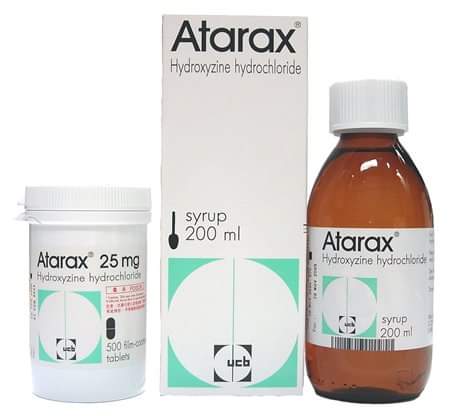Why Was Atarax Discontinued?

Atarax was a popular brand of hydroxyzine hydrochloride an antihistamine used to treat allergy symptoms. It is also used to treat anxiety and tension. This medicine can be used with other medicines to induce sleep before surgery. It is more popular than comparable drugs. Hydroxyzine hydrochloride is only available as a generic drug; all brands have been discontinued.
Atarax belongs to a class of drugs called Antihistamines, 1st Generation, Antiemetic Agents, Antihistamines, Piperazine Derivatives. It works by blocking the action of histamine a substance in the body that causes allergic symptoms. It also works by decreasing activity in the brain. The sedative effect of hydroxyzine usually takes 15 to 30 minutes to come on and persists for 4 to 6 hours following a single dose. Hydroxyzine can suppress the inflammatory response and itch associated with intradermal skin tests with allergens and histamine for up to 4 days.
Atarax® was available in the following forms:
- Tablet: 10 mg, 25 mg, 50 mg
- Liquid: 10 mg/5 ml
- Injection: 25 mg/ml, 50 mg/ml.
Why was Atarax discontinued?
Atarax was first made by Union Chimique Belge in 1956 and was approved for sale by Pfizer in the United States later that year. However, it was discontinued in the US most likely because it became an uneconomically viable product line for its manufacturer and was discontinued for business reasons. It was not removed from the market for safety or effectiveness reasons, according to the FDA. A generic version of Atarax known as hydroxyzine hydrochloride is available in the US and is very affordable.
What are the potential side effects of Generic Atarax (hydroxyzine hydrochloride)?
Like most drugs, generic Atarax (hydroxyzine hydrochloride) may cause mild or serious side effects. The lists below describe some of the more common side effects that generic Atarax (hydroxyzine hydrochloride) may cause. These lists don’t include all possible side effects.
Keep in mind that side effects of a drug can depend on:
• your prescribed dosage
• your age
• other health conditions you have
• other medications you may be taking
Your doctor or pharmacist can tell you more about the potential side effects of generic Atarax (hydroxyzine hydrochloride). They can also suggest ways to help reduce side effects.
Mild side effects
Here’s a short list of some of the mild side effects that generic Atarax (hydroxyzine hydrochloride) can cause. To learn about other mild side effects, talk with your doctor or pharmacist, or read the generic Atarax (hydroxyzine hydrochloride) prescribing information.
Mild side effects of generic Atarax (hydroxyzine hydrochloride) that have been reported include:
• constipation
• confusion
• dry mouth
• fatigue (lack of energy)
• headache
• insomnia (trouble falling asleep or staying asleep)
• nausea
• trouble concentrating
• weakness
• sleepiness*
• low blood pressure*
Mild side effects of many drugs may go away within a few days or a couple of weeks. But if they become bothersome, talk with your doctor or pharmacist.
Serious side effects
Serious side effects from generic Atarax (hydroxyzine hydrochloride) can occur, but they are not common. If you have serious side effects from hydroxyzine, call your doctor right away. However, if you think you’re having a medical emergency, you should call 911 or your local emergency number.
Serious side effects of generic Atarax (hydroxyzine hydrochloride) that have been reported include:
• abnormal heart rhythms, such as long QT syndrome and torsades de pointes
• skin reactions*
• allergic reaction*.
You may also find useful information on Can Hydroxyzine Cause Sudden Death?





